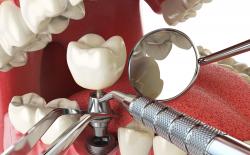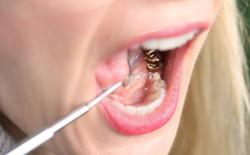What is zirconia?
Zirconia is zirconium-dioxide, a metal oxide that is widely used for manufacturing implants, crowns and bridges. It is the toughest oxide ceramic used in dentistry with a very high resistance to crack propagation.
Even though zirconium is a metal, its oxide, zirconia is not considered to be a metal, the structure and physical properties of zirconia and zirconium are very different. Zirconia restorations are metal free.
The refractory properties of zirconia makes the appearance of these implants same as the adjacent natural tooth, so zirconia might be an ideal substitue of titanium implants when the esthetics of titanium is not ideal (usually for front teeth implants).
Zirconia implants have started replacing titanium implants in certain cases as the inflammatory response and bone resorption induced by ceramic particles are less than those induced by titanium particles, which means the biocompatibility of ceramics is even more favorable than titanium.
Although zirconia implants are relatively new, the material itself has been used for quite some time in restorative dentistry. Zirconia crowns and zirconia bridges are very popular to fix a broken tooth or missing teeth.
A good video about zirconia dental implants. Duration: 2:01.
Advantages of zirconia implants
- Higher esthetics: Zirconia implants give an excellent esthetic result and look like your natural tooth.
- Recessed gums: They can be used in recessed gums where titanium implants would give poor results esthetically.
- Metal-free: It is completely inert material. So one of the best choice in patients who are allergic to metals.
- Lower plaque retention: The smoother and polished surface due to improved property of resistance to crack propagation maintains its surface integrity. This significantly lowers the retention of plaque on the surface.
- Durability: Higher durability due to phase transformation.
- Lower thermal conductivity.
- Non-corrosive.
- Excellent flexural strength.
- Greater degree of osseointegration: It shows greater bone contact and adaptation to the bone.
- Shorter healing period: Accelerates healing by promoting the formation of new bone cells and blood vessels.
A short video about the esthetics of zirconia implants. Duration: 1:03.
Disadvantages of zirconia implants
- Low temperature degradation: This is one of the biggest drawbacks of zirconia implants. This means aging, resulting in lesser strength due to the deterioration of the material.
- Susceptible to fracture: This is seen only if the angulation of the implant is incorrect with undue stresses present while functioning. Higher chances of fractures in aged material.
This video is a bit dated, but it focuses on the cons of zirconia implants. The dentist mentions a few things you might want to discuss with your implantologist. Duration: 4:45.
How much does a zirconia implant cost?
Zirconia dental implants cost between $500 to $600. (This is what the dentist pay for the implant.) They are more expensive than titanium implants which are about $100 to $150 more affordable.
However as a patient you are probably more interested in the total cost of your treatment, which are likely to be significantly higher than the price of the implant itself.
When restoring a single teeth with tooth implants, you not only pay the implant itself, but also the crown, your dentist and any additioanl treatments you might need. The total cost of a single tooth restoration is around $3,000 and $5,000.
Since the price difference between zirconia and titanium implants is only around $100, this won't really affect your final price. Implant brand, crown type and dentist fees are much more significant factors.
Frequently Asked Questions
Are zirconia implants safe?
Yes! Zirconia implants are safe. They have tough, insoluble surface, there is no chance of chemical release so they usually don't cause any risk of toxicity due to leaching of the chemical constituents.
Is this implant really metal free?
These implants are made of zirconia which is a crystal form of the transitional metal zirconium. However the metal is treated and converted to its crystalline form and stabilized, which is metal free. The zirconia crystal has very different properties than metal zirconium.
Can I be allergic to zirconia?
Zirconia rarely causes any allergic reactions, it is a biocompatible material.
Zirconia lowers plaque retention so the chances of inflammatory reactions are significantly reduced.
However if after the implant placement you feel some discomfort, you should contact your dentist.
Is zirconia the only material used for ceramic implants?
Clinically, the answer is yes. Because it is the only type of ceramic which can be improved greatly to serve as an implant.
Unlike other ceramics, zirconia has a very high resistance to crack propagation. Other types of ceramic implants can be used for in-vitro studies and researches.
How long do zirconia implant last?
They can serve comfortably for 10-15 years with proper oral care and hygiene. Although studies are insufficient and are still under progress as zirconia dental implants have been recently introduced in implant dentistry.
Is zirconia implant better than titanium?
Zirconia is an alternative to titanium implants in patients who are allergic to metals.
Both materials have their own pros and cons. Both are biocompatible and has good functional results.
If you need an implant in the anterior region (front tooth), zirconia might be esthetically a better choice.
The decision completely depends upon the requirements of the patient.
Do zirconia implants support bacterial growth?
Zirconia does not conduct electrical charge. Bacterial growth on the surface of a zirconia implant is far less likely to adhere due to its non-conductivity, thus creating an oral environment that promotes much healthier gums.

